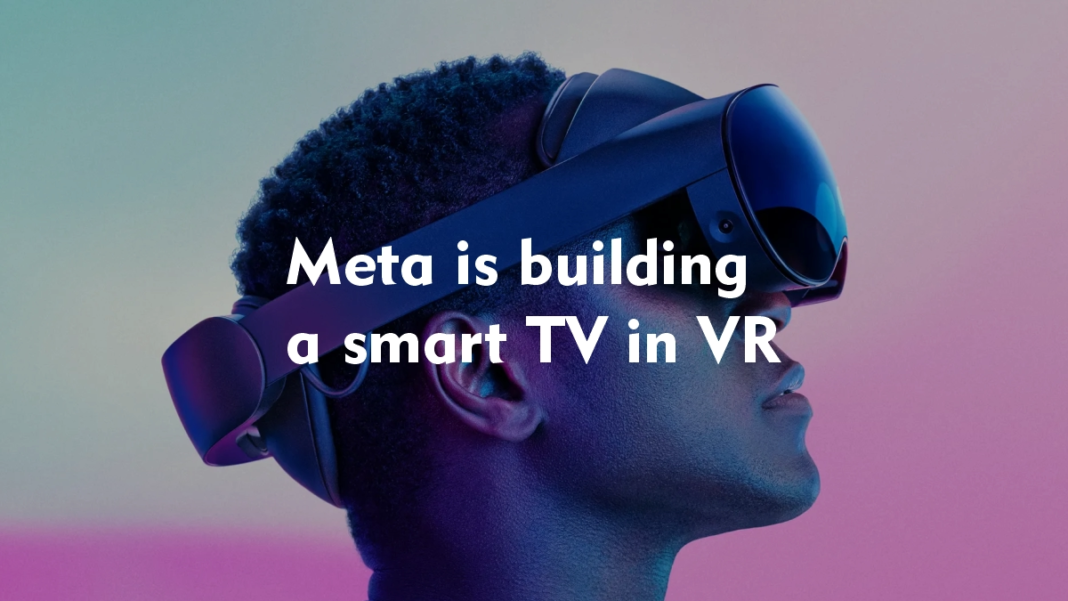The Evolution of Home Entertainment
In 2025, Meta is building a smart TV – in VR, and it’s a move that could reshape how we consume entertainment. Horizon TV, the new app for Meta Quest headsets, brings the familiar interface of a smart TV into a fully immersive VR environment.
Imagine walking into your living room and putting on your VR headset – not to play a game, but to open a TV interface where your walls expand into a cinematic universe. With hero images, app icons, and content recommendations, Horizon TV mimics a traditional smart TV, but the experience is entirely virtual.
Meta’s ambition is clear: they want the Quest headset to become more than a gaming device – it should be a central hub for entertainment, social interaction, and immersive experiences. But will it succeed where previous VR initiatives struggled?
The Rise of Horizon TV: Meta’s Vision for Virtual Entertainment
A New Era in Streaming
Meta’s Horizon TV app offers a smart TV-style interface within the Quest VR headsets. This innovation allows users to access content from platforms like Amazon Prime Video, Peacock, and Disney+, all within a virtual environment. The app’s design mirrors traditional smart TVs, featuring app icons, content recommendations, and a user-friendly navigation system. The Verge
Immersive Content Partnerships
To enhance the viewing experience, Meta has partnered with content creators and studios. Collaborations with James Cameron’s Lightstorm Vision aim to bring 3D-enabled films and immersive sports content to Horizon TV. These partnerships underscore Meta’s commitment to providing high-quality, engaging content for its VR users. Reuters
Meta’s Strategy: Monetization and Market Expansion
Adapting Smart TV Business Models
Meta’s approach to Horizon TV emulates traditional smart TV business models, focusing on ad and subscription revenue streams. By integrating content from various streaming services and offering immersive experiences, Meta seeks to capture a broader audience and establish a sustainable revenue model within the VR ecosystem. Lowpass
Addressing Content Fragmentation
Despite the promising features of Horizon TV, challenges remain. Notably, major streaming platforms like Netflix, Hulu, and HBO are absent from the app. Meta is actively working to address these gaps, aiming to provide a comprehensive content library that meets the diverse preferences of its users. Lowpass
The Future of VR Entertainment: Horizon TV’s Potential
Beyond Traditional Viewing
Horizon TV represents more than just a virtual screen; it embodies the future of interactive and immersive entertainment. With features like co-watching, spatial audio, and customizable viewing environments, Horizon TV offers a unique platform for social interaction and personalized content consumption.
Integration with Emerging Technologies
Looking ahead, Horizon TV plans to integrate with emerging technologies such as AI-driven content recommendations, eye-tracking for personalized experiences, and cross-platform compatibility. These advancements aim to enhance user engagement and solidify Horizon TV’s position as a leading VR entertainment hub.
Embracing the Metaverse in Your Living Room
Meta’s initiative to build a smart TV in VR signifies a transformative shift in home entertainment. By merging the convenience of traditional smart TVs with the immersive capabilities of VR, Meta is redefining how we experience media. As Horizon TV continues to evolve, it holds the potential to become the centerpiece of the digital living room, offering users an unparalleled entertainment experience.
People Also Asked
Q1: Can I watch Netflix in VR?
Currently, Netflix is not available on Horizon TV. However, Meta is working to include major streaming platforms in the future.
Q2: Will VR replace traditional gaming consoles?
While VR offers unique immersive experiences, it is unlikely to fully replace traditional gaming consoles. Instead, VR will coexist, providing alternative gaming experiences.
Q3: What is the 444 rule for RV?
The 444 rule refers to a guideline for RV travel, suggesting that drivers should aim to drive no more than 400 miles per day, take a break every 4 hours, and arrive at their destination by 4 PM.
Q4: Why did Meta VR fail?
Past challenges include content fragmentation, licensing issues, and early negative user experiences with motion sickness.
Q5: What will VR be in 10 years?
VR will likely be mainstream, combining gaming, social interaction, and immersive entertainment in home environments.


